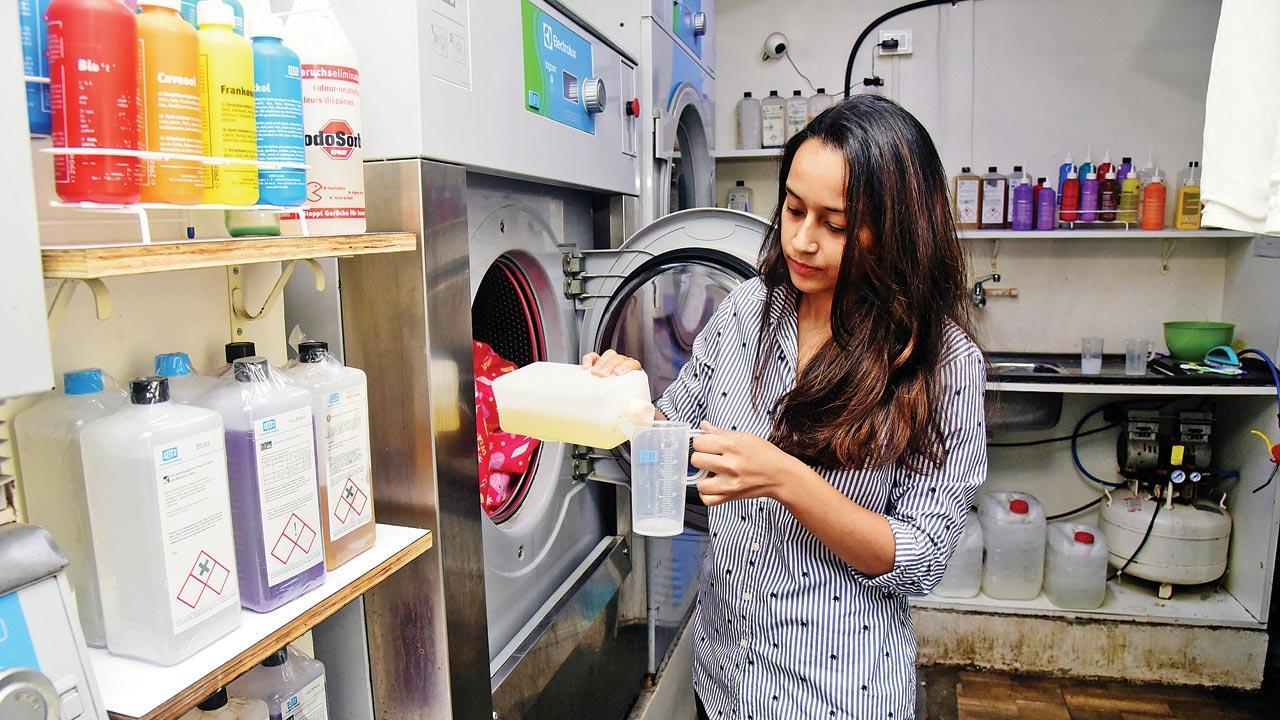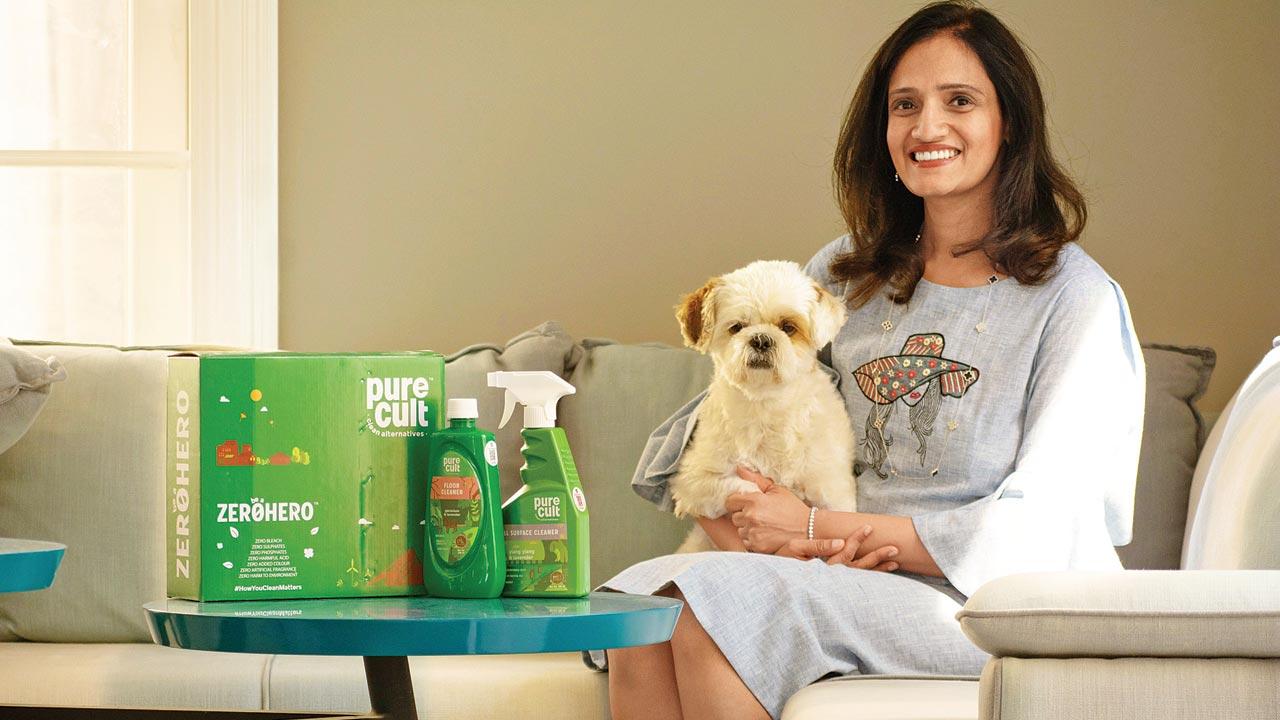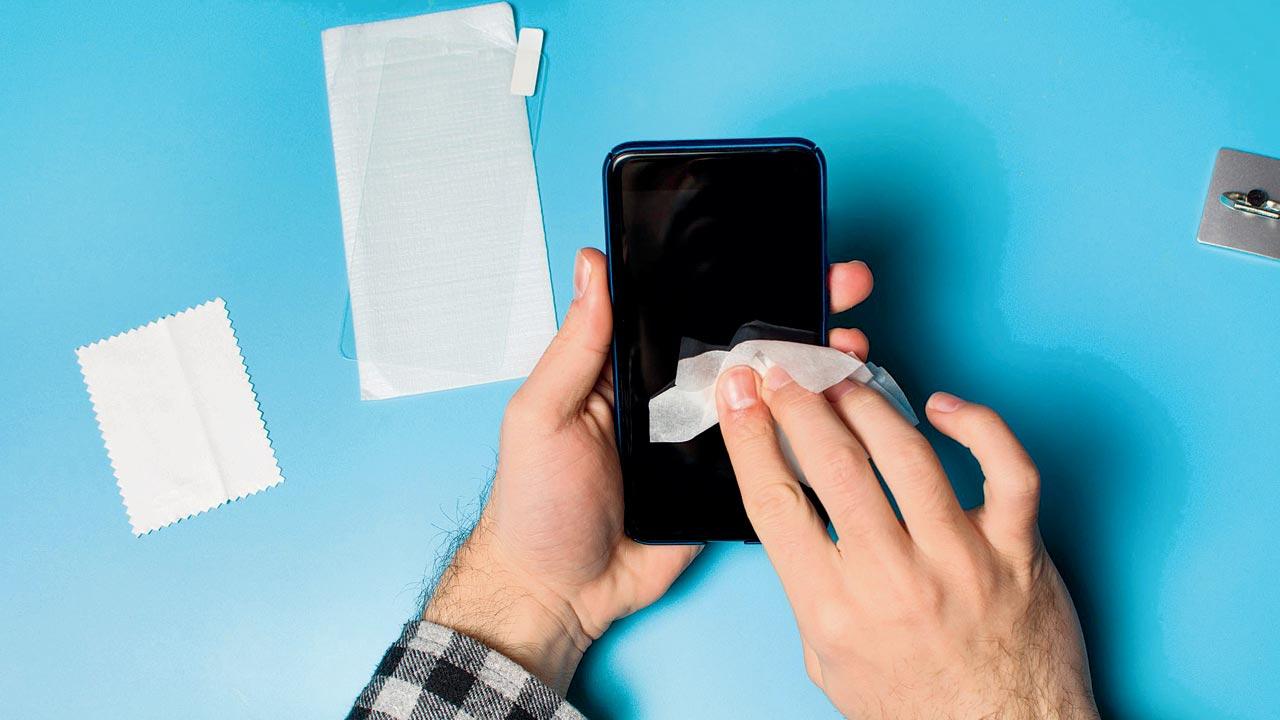Entrepreneurs helming eco-friendly home hygiene startups indulge in plain speak about what you should and shouldn’t (ever) be using

Ayushi Pande, partner at Laundromania, says they do not use carcinogenic chemicals like Perchloroethylene (PERC), which most cleaners in India use and are banned in the US and EU. Pic/Shadab Khan
One of the positive fallouts of the pandemic has been the embracing of sustainability in the home hygiene segment. The need for ingredient transparency and cleaner techniques, experts say, is driving entrepreneurs to question traditional processes and flag dubious formulations.
ADVERTISEMENT
mid-day reached out to three sustainable home hygiene startups to discuss the importance of informed choice.
‘Toxic PERC being phased out everywhere except India’
The alternative: Professional wet cleaning
Proposed by: Ayushi Pande, partner, Laundromania
In 2018, Ayushi Pande launched Laundromania in Mumbai to introduce sustainability and modernisation in the laundry and dry cleaning segment. “India has an informal, labour-intensive laundry industry that has been traditionally running with the help of a network of dhobis. Despite the increase in disposable income, no significant development has taken place [in the sector],” she observes. According to her, insufficient knowledge of which chemicals to use, and improper handling techniques for different materials can damage outfits. This reduces the recycling capability of the fabric. “So, people end up buying more [clothes] and using less.”
Incidentally, the term “dry cleaning” is a misnomer given that the technique actually involves processing clothes in a liquid solvent to remove soil and stains. “The problem here is that a majority of dry cleaners use the solvent perchloroethylene or “PERC” to treat fabrics. These chemicals are toxic and the pollution they cause persists in the environment for decades. Workers handling these chemicals can get affected too by the presence of carcinogenic elements,” she explains. Although efficient at degreasing and deodorising textiles, PERC has been shown to cause cancer as well as kidney and liver damage in animal studies. Other symptoms of short term exposure include nausea, headache and unconsciousness. PERC is classified as a Toxic Air Contaminant by the Environment Protection Agency (EPA) and is being actively phased out of the drycleaning process worldwide, except in India.
Pande has been exploring “green” and safer alternatives that are nontoxic and currently available in the market, such as professional wet cleaning, which uses water and special equipment that gently washes, dries and restores fabrics; liquid carbon dioxide (CO2) cleaning, in which carbon dioxide is pressurised into a liquid solvent that safely cleans. Another green dry cleaning alternative is using liquid silicone, known as decamethylcyclopentasiloxane (D5). Professional wet cleaning, which she says, is the safest choice for India, uses less water than traditional laundry. “We explored the universe of detergents, liquid solvents, chemicals, and continuously ran experiments to do pairwise-testing to conclude which processes work for what kind of stains.” Through this research, Pande hopes to bust the myth that green cleaning processes aren’t as effective. “Not only does the green process clean as well as the traditional chemical process, it also leaves the fabric softer and ups the longevity of the garment.”
The pandemic has propelled us to think of cleaner alternatives, she thinks. “People have become more particular about who their garment comes in contact with. Despite the pandemic, we have expanded the brand to five stores in Mumbai and a much larger coverage with free pickup and drop offered to customers.” Pande’s next step is to tap into the home fabric care segment.
‘Ammonia in hand wash, shampoo, is caustic’
The alternative: Products with EWG score of 1
Proposed by: Roopa Hariharan, co-founder, PureCult
 PureCult has pledged to recycle one unit for every unit sold and help customers turn plastic neutral
PureCult has pledged to recycle one unit for every unit sold and help customers turn plastic neutral
It was the slow death of the Bellandur lake, one of the largest in Bengaluru, that propelled Roopa Hariharan to rethink her home hygiene choices. Previously dotted with wetlands of heritage value, the city has been witnessing an alarming decline in their numbers, leading to a shift from thriving to dying. “Our home cleaners wash into these lakes every day. Ninety per cent of the lakes are affected by sewage accumulation. With companies increasingly dumping debris and solid waste into the wetlands, it’s causing marine deaths in the regions near Sankey, Jakkur, and Lalbaugh,” she says.
Her brand PureCult offers kitchen cleaners, dishwashing liquid, laundry detergents and fabric conditioners that are made with plant-based ingredients. She believes consumers should be aware of the chemicals to avoid. Products and ingredients with labels like Nordic Swan, Ecolabel and those certified by EWG (Environmental Working Group) and those having an EWG score of one are safe alternatives to choose from. “Look out for ingredients such as hydrochloric acid, ammonia, sulphuric acid, phosphates and phthalates. You should avoid these at all costs.”
Ammonia, present in various skin care products, shampoos, liquid hand wash, body wash, helps make the products viscous.” In humans, ammonia can irritate the eyes, nose and mucous membrane. It is caustic in nature and can cause damage to cells if dosage is not regulated.” The average household contains about 62 toxic chemicals, say environmental experts. From the phthalates in synthetic scents to the poisonous fumes in oven cleaners, Hariharan says we are constantly surrounded by them. “While some ingredients create rapid reactions when we are exposed to them [headaches from fumes, or skin burns], others cause noticeable symptoms only from repeated exposure. By then, the damage is done.” The startup uses 50 per cent Post Consumer Resin (plastic that has already been recycled and is repurposed, ready to use again) in all their HDPE (High-density polyethylene) bottles. “All our bottles are 100 per cent recyclable. Our partner for planner recycled plastic ensures it meets the EU and US standards for packaging safety. The final product is tested with NABL certified labs for presence of heavy metals such as Lead, Mercury, Cadmium and Hexavalent Chromium.” As of January 2022, PureCult has pledged to recycle one unit for every unit sold and help customers turn plastic neutral.
‘People use sanitisers on their gadgets’
The alternative: Non-alcoholic gadget wipes
Proposed by: Ishan Grover, partner, Svish

While COVID-19 ushered in a paradigm shift in the high-end urban consumer approach to domestic cleaning, the focus firmly remained on surfaces, says Ishan Grover, a seasoned craft brewer. “But have you thought about the germs that are living on your gadgets? Your smartphones, which you take everywhere, are germ foundries. They stay close to your mouth and ears.” According to microbiologist, Charles Gerba of the University of Arizona, cellphones carry 10 times more bacteria than most toilet seats. Some studies found 3,000 bacteria per square inch on computer keyboards and 1,600 on the average computer mouse.
 Their gadget wipes are made with a non-alcoholic formulation and 100 per cent biodegradable viscose fibre which is skin friendly
Their gadget wipes are made with a non-alcoholic formulation and 100 per cent biodegradable viscose fibre which is skin friendly
Last year, Grover teamed up with adman Jaideep Mahajan to launch Svish, a hygiene brand that offers gadget disinfectant wipes, surface disinfectant sprays and toilet seat sanitiser spray. “We noticed that people are spraying sanitisers on their smartphones too.” Their gadget wipes are made with a non-alcoholic formulation and 100 per cent biodegradable viscose fibre which is skin friendly. “We infused it with natural fragrance of lemon and pine unlike most others that had a lingering, pungent aroma,” says Grover.
 Subscribe today by clicking the link and stay updated with the latest news!" Click here!
Subscribe today by clicking the link and stay updated with the latest news!" Click here!







